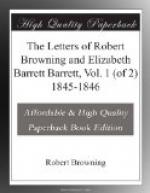And how I should like to know what poets have been your sponsors, ’to promise and vow’ for you,—and whether you have held true to early tastes, or leapt violently from them, and what books you read, and what hours you write in. How curious I could prove myself!—(if it isn’t proved already).
But this is too much indeed, past all bearing, I suspect. Well, but if I ever write to you again—I mean, if you wish it—it may be in the other extreme of shortness. So do not take me for a born heroine of Richardson, or think that I sin always to this length, else,—you might indeed repent your quotation from Juliet—which I guessed at once—and of course—
I have no joy in this contract
to-day!
It is too unadvised, too rash and sudden.
Ever faithfully yours,
ELIZABETH B. BARRETT.
[Footnote 1: ‘Not yet reached the prelude’ (Aesch. Prom. 741).]
R.B. to E.B.B.
Hatcham,
Tuesday.
[Post-mark, February
11, 1845.]
Dear Miss Barrett,—People would hardly ever tell falsehoods about a matter, if they had been let tell truth in the beginning, for it is hard to prophane one’s very self, and nobody who has, for instance, used certain words and ways to a mother or a father could, even if by the devil’s help he would, reproduce or mimic them with any effect to anybody else that was to be won over—and so, if ’I love you’ were always outspoken when it might be, there would, I suppose, be no fear of its desecration at any after time. But lo! only last night, I had to write, on the part of Mr. Carlyle, to a certain ungainly, foolish gentleman who keeps back from him, with all the fussy impotence of stupidity (not bad feeling, alas! for that we could deal with) a certain MS. letter of Cromwell’s which completes the collection now going to press; and this long-ears had to be ’dear Sir’d and obedient servanted’ till I said (to use a mild word) ‘commend me to the sincerities of this kind of thing.’! When I spoke of you knowing little of me, one of the senses in which I meant so was this—that I would not well vowel-point my common-place letters and syllables with a masoretic other sound and sense, make my ‘dear’ something intenser than ‘dears’ in ordinary, and ‘yours ever’ a thought more significant than the run of its like. And all this came of your talking of ‘tiring me,’ ‘being too envious,’ &c. &c., which I should never have heard of had the plain truth looked out of my letter with its unmistakable eyes. Now, what you say of the ‘bowing,’ and convention that is to be, and tant de facons that are not to be, helps me once and for ever—for have I not a right to say simply that, for reasons I know, for other reasons I don’t exactly know, but might if I chose to think a little, and for still other reasons, which, most likely, all the choosing and thinking in the world would not make me know, I had rather




